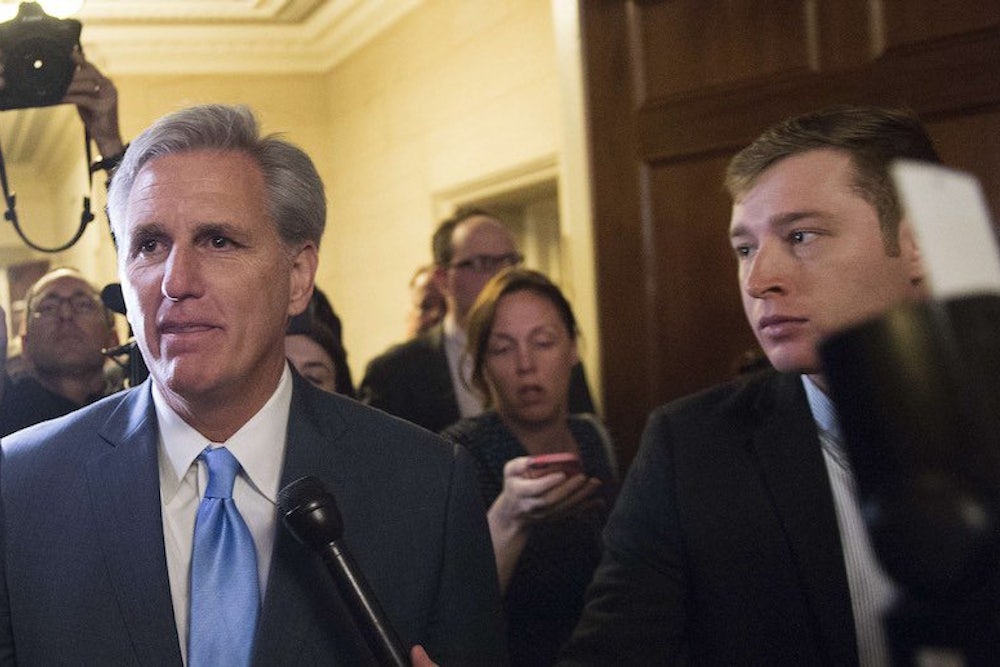If House Speaker John Boehner secretly had no intention to resign, and was instead using the threat of retirement to teach Republican House members that they need him—not the other way around—he's doing a masterful job. But Boehner was engaged in no such ruse, and the Republican Party is drastically worse off as a result.
After making a series of ill-considered remarks over the past week that underscored his unfitness for the job, Boehner’s heir presumptive, House Majority Leader Kevin McCarthy, withdrew his candidacy for the Speakership at a conference meeting Thursday afternoon. McCarthy, who helped recruit a huge class of conservative freshmen ahead of the GOP's 2010 midterm landslide, had significant support within the conference. But he lacked the trust of a few dozen conservative hardliners, some of whom comprise the House Freedom Caucus, who have grown frustrated with the existing leadership team for its strategic reluctance to use legislative deadlines—especially those governing appropriations and the debt limit—as leverage to seek substantive concessions from Democrats. As doubts about McCarthy's candidacy grew, it became clear that conservatives would resist a clean succession and fight his election on the House floor.
This creates a void almost nobody in the House Republican conference is fit, able, or willing to fill. Minutes after McCarthy announced his decision, Representative Paul Ryan, whom most House Republicans consider the only senior member with the skill to bridge strategic divisions in the party, reiterated his absolute unwillingness to run.
“Kevin McCarthy is best person to lead the House, and so I’m disappointed in this decision,” Ryan’s statement read. “Now it is important that we, as a Conference, take time to deliberate and seek new candidates for the speakership. While I am grateful for the encouragement I’ve received, I will not be a candidate. I continue to believe I can best serve the country and this conference as Chairman of the Ways and Means Committee.”
The most rational outcome, and the most ironic, would be for Boehner to rescind his own resignation, and to cite the chaos that took hold after his announcement as a reminder that the reactionaries who deposed him are completely lost without his leadership. When the people who threatened to fire you beg you not to quit instead, their bluff has been called.
But Boehner’s decision to resign was almost certainly not a feint. He has vowed to serve as Speaker until a replacement is selected, but not on a permanent basis. Somebody else—a somebody we don’t yet know, and whose motives and capabilities won’t be well understood—will have to emerge to fill the power vacuum. Representative Jeb Hensarling—a wily, far-right Republican from Texas—has played footsie with the idea. As a Boehner surrogate, Oklahoma Representative Tom Cole’s name has been kicked around, too, but he’s probably been too critical of Boehner’s antagonists to easily secure the gavel. None of the plausible candidates enjoys Ryan's unique mix of support among conservatives and trust among the party establishment. But as willing members with broad support begin express interest, the leadership race will resume, and the election that was supposed to occur today will be rescheduled.
What’s more clear now than it was two weeks ago—and it was fairly clear back then—is how crucial it is for Boehner to use his numbered days to clear the deck for the next Speaker, and most importantly to increase the national debt limit in advance of an anticipated lapse in borrowing authority early next month. The consequences of a default on the national debt are too high to hand the debt limit to an untested speaker, or to allow Freedom Caucus members and other conservatives to hijack the issue. Boehner has committed, again, to remaining Speaker until a new one is selected. If Boehner hands responsibility for the debt limit over to this crew, instead of increasing it unconditionally while he has control, it’ll be his most reckless, cowardly, shameful moment.
